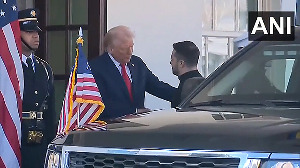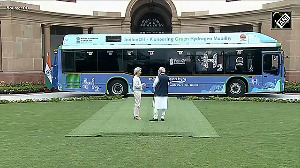The automobile industry missed the Budget bogey as its demand for across-the-board excise duty structure of 16 per cent was not met. Small cars already enjoy 16 per cent excise while the same for big cars is 24 per cent. But, it may not be an impediment enough to pull back the Indian automobile industry, which posted the highest ever annual growth of 20 per cent in passenger vehicle sales.
The Indian car market is dominated by small cars. Three companies - Maruti Udyog, Tata Motors and Hyundai - have the biggest share of the small car market, leaving global majors such as General Motors, Ford, Toyota and Honda with only a marginal market pie.
To grab a bigger pie of the Indian car market, all companies are eyeing the small car segment. Toyota, Ford, Honda, Mitsubishi and General Motors will launch their small cars in the next three years.
This is expected to take Indian passenger vehicle sales to 2.1 million units by the end of March 31, 2010.
According to Frost & Sullivan, sales of passenger vehicles in India are likely to grow at 14.9 per cent each year to reach the 2.1 million mark. The US-based consultancy Keystone, a subsidiary of LaSalle Consulting Associates, has forecast that India will become the world's third largest automobile market by 2030, behind only to China and the US.
The size of the Indian vehicle market is forecast to cross the 2.1 million by 2010 (assuming a consistent GDP growth rate of 6 per cent) from the 1.1 million vehicles expected to sell in 2006-07.
Major companies like MUL, Volkswagen, Mahindra-Renault-Nissan, Tata-Fiat Motors and Hyundai Motors are expanding their capacities to meet the growing demand. In the next few years, every major global player will have a production facility in India.
Even though the Indian economy grew 9.1 per cent in the six months ended September 30, the fastest semi-annual growth in 15 years, vehicle penetration was only 8.5 in 1,000, the lowest among developing countries. According to industry experts, currently the passenger vehicle demand outstrips supply.
"Not enough vehicles are being produced to meet the current demand. We are trying to keep pace with the demand but their production constrains are failing us. So we are doubling our capacities to 6,00,000 units annually in the light of expected demand, and the potential of a million cars likely to be added in the Indian market," says a senior executive of HMIL.
In the next fiscal, about 50 new cars are likely to be introduced in the Indian market. While the majority of these would be variants, some new models will also hit the road.
Snippets
Advantage diesel
Diesel cars are no longer boring. Backed by new technologies and cheaper operating costs, the demand for diesel cars is rising. So much so that every third car sold in the Indian market runs on diesel.
Over the last two years, the market share for diesel cars has gone up by 10 per cent, forcing companies to roll out diesel variants. As the market share of diesel cars is growing at about 6-9 per cent every year, it is expected to form 45 per cent of the total market by 2010.
Maruti Udyog, having avoided launching diesel cars for over two decades, has now started its own diesel power-train manufacturing facility. It has rolled out the diesel version of its popular model Swift, and plans to bring out new models in the future.
Scott McCormack, vice-president, sales and marketing, Ford India, says: "Over 70 per cent of our mid-segment car sales came from the Fiesta's diesel variant, where our proprietary Turbo Direct Common Rail injection technology has been accepted well by the customers."
Currently, the diesel car market is dominated by Tata Motors and Mahindra and Mahindra. But other companies are also trying hard to corner a good share of the market. General Motor's Aveo and Hyundai's Getz and Sonata will also have diesel variants.
N R Naryanan of ICICI Bank, the largest biggest player in auto finance, says, "Diesel is definitely gaining an upper hand in the car market. Customers are looking at the running cost and affordability options, which are met by newer diesel variants offering second generation common rail diesel injection system."
The Society of Indian Automobile Manufacturers, the apex body of Indian car makers, says, "The turbo charged CRDi engines are comparable with any petrol engines. These noise and rattle-free engines along with availability of better quality diesel in the market is transcending into greater sales for diesel cars."
Luxury on wheels
Most of the world's luxurious cars are now available in India. Be it the super exclusive Maybach, or Bentley, Audi, Porsche, Rolls-Royce and Lamborgini.
These dream cars may not be selling like hot cakes, but their super luxury definition is wooing emerging millionaires.
Most of these cars are built on demand, and have special quotas allotted for the international market. While the Indian car market is swelling to over a million, these top-end luxury cars are slowly and gradually taking the lead. Bentley, which costs over Rs 2 crore (Rs 20 million), has an allotment of a mere 10 cars for India. The quota has already been exhausted, and has been enhanced to 15 for 2007.
BMW and DaimlerChrysler are to set up manufacturing facilities in India to make the most of the low cost of operations.
To provide after-sales services to the Indian customers, these companies have established their dealership and after-sales network across the country. While most of these marquees are currently imported, in future, the best cars in the world are likely to be manufactured in India.







 © 2025
© 2025